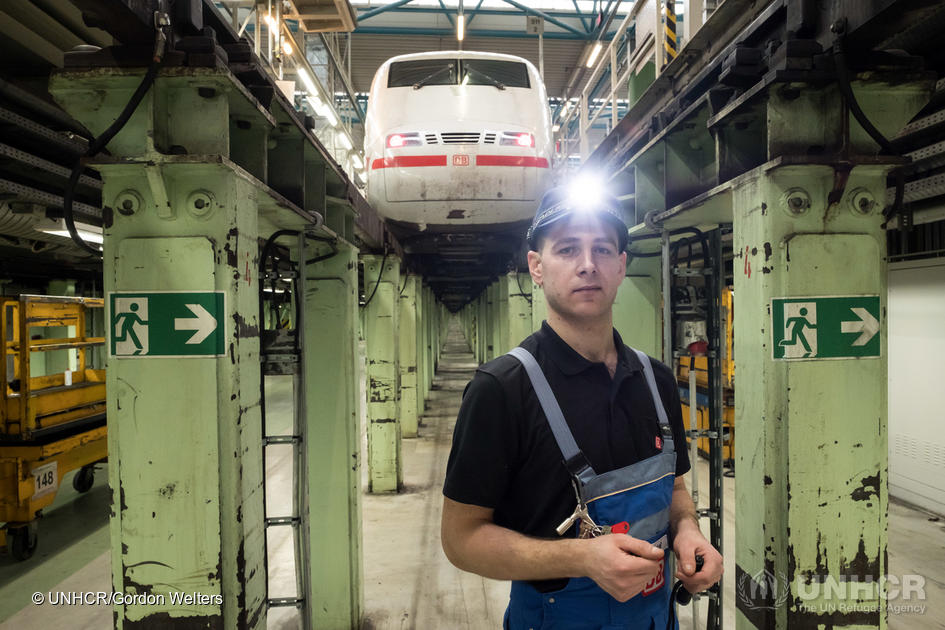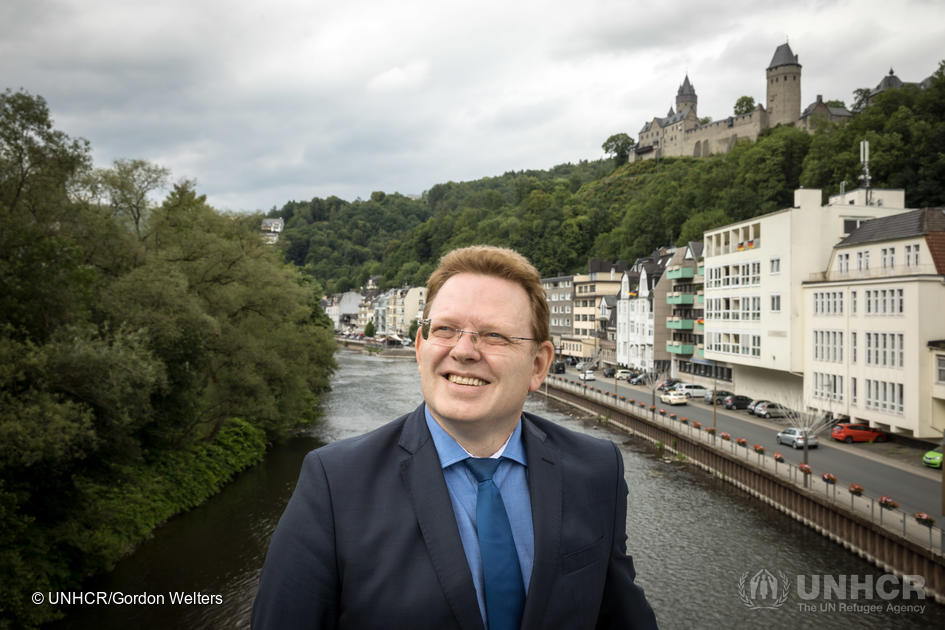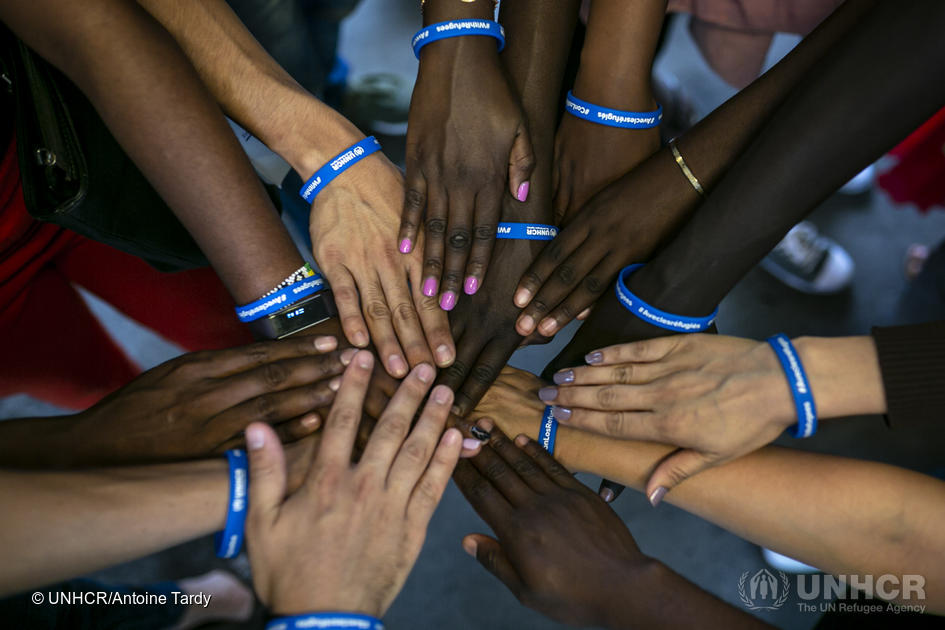Refugees have enormous settlement difficulties when they arrive in a new country with an unfamiliar setting. They often arrive alone, separated from their families and with little more than the clothes on their back. Unlike immigrants, they have no time to prepare for such a fundamental change in their lives. In addition, many arrive traumatised by their experiences of persecution, violence, or discrimination.
In addition to their efforts to forge new lives in a strange land, many refugees bear psychological and physical scars from past abuses and suffering that can endure for years. But they find the strength to overcome adversity. They are capable – if provided with the necessary tools of language, skills development, employment opportunities and other integration support – of not only assuming responsibility for their own affairs but also contributing to their host society, economically, socially and culturally.
The integration of refugees is an important part of the commitments of States under the 1951 Convention relating to the Status of Refugees and its 1967 Protocol. These two treaties were landmarks in the setting of universal standards for the treatment of refugees found to be necessary additions to the general human rights instruments. These include:
- The right not to be returned to persecution or the threat of persecution (the principle of non-refoulement);
- The right not to be discriminated against in the grant of protection;
- The right not to be penalized for unlawful entry into or presence in the country where asylum is sought, given that persons escaping persecution cannot be expected to always leave their country and enter another country in a regular manner;
- The right not to be expelled, except in specified, exceptional circumstances to protect national security or public order;
- The right to minimum, acceptable conditions of stay, which would include: freedom of movement, the right to education and to gainful employment or self-employment, access to public relief and assistance including health facilities, the possibility of acquiring and disposing of property and the right to obtain travel and identity documents. Contracting States to the Convention are also expected to facilitate naturalization of refugees by reducing legal and administrative barriers to citizenship and to actively support refugees’ family reunification.
These are the building blocks of integration. Successful integration will thus depend on the extent to which the refugees’ rights under the 1951 Convention and applicable human rights treaties are effectively protected.
The process of integration is obviously complex and gradual. It is a two-way, long-term process of mutual adaptation between refugees and the host society that demands constant dedication. Integration thus requires efforts by all parties concerned, including a preparedness on the part of refugees to adapt to the host society without having to forego their own cultural identity, and a corresponding readiness on the part of host communities and public institutions to welcome and meet the needs of a diverse population. The ultimate goal is ensuring their full and equal membership in society.
Refugee integration in Israel: challenges and opportunities
There are very few people who have obtained refugee status in Israel. Some, mostly Sudanese nationals from the Darfur region, have been granted humanitarian status. Both groups, numbering some 1,800 persons together, enjoy socio-economic rights on almost equal footing with Israeli citizens. They can also participate in municipal elections. In both cases, however, their status is temporary and subject to constant review. Since the general approach is that their long-term stay in Israel is not desirable, there is no refugee integration policy or programme.
Asylum-seekers have few opportunities for self-sufficiency and self-reliance, let alone for integration. As of the beginning of 2020, there were nearly 50,000 asylum-seekers waiting for their refugee applications to be reviewed and decided on by the Israeli authorities. Aside from guaranteed access to education for children 3-17 years of age and emergency medical care, asylum-seekers do not benefit from the same rights as refugees. Their employment is tolerated and most are able to find work but only in low-skilled, manual jobs at the bottom of the pay scale. They live in isolation at the margins of Israeli society, and their continued presence remains a polarizing topic in the country.
Israel has the opportunity to get the integration of refugees and asylum-seekers right and to harness its benefits. If certain community groups become marginalised, excluded, and impoverished, the long-term losses to the State – whether socially, economically, and security-wise – could far outweigh the required investments. The quicker they are integrated into the labour market, the greater the tax revenue they generate.
Key elements of integration
There is no “one-size-fits-all” approach to integration. However, there are a number of broad goals of integration that apply across countries. These include efforts to enable refugees to reach and develop their full potential, to protect the human rights of refugees, reduce their marginalization, and foster social cohesion and harmonious coexistence. Access to education, employment, housing, and family reunification are the key ingredients of integration in any society.
Learning the language of the host community is essential and services should be available to facilitate this from the earliest possible stage. Refugees and asylum-seekers without language skills face problems such as isolation, exploitation and the distrust of the host community. Language is therefore a fundamental tool in the integration process. It is also crucial for developing good relations with the host population.
Education also constitutes one of the most powerful tools for integration, since it allows for the development of basic skills that become the bedrock for further learning, leading to employment and social inclusion. Participation and accomplishment in education increases opportunities for self-reliance and provides a sense of purpose, normalcy, and continuity in otherwise unsettled environments. Educated children and youth stand a greater chance of becoming adults who can participate effectively in civil society in all contexts.
Employment is a core part of the integration process. A good job is essential for integration as it provides the refugee/asylum-seeker not only with an income but also with independence, self-esteem, social status, and recognition in the wider community. In other words, employment provides an opportunity for positive socialisation, and for the development of resourcefulness and self-sufficiency.
Effective integration requires access to basic services for refugees and asylum-seekers from the time of arrival. This includes health services, social safety nets, and support for dignified housing. Poor quality or inadequate housing can affect physical and mental health, as well as influence education and vocational training, as it can affect concentration and motivation.
Combating discrimination, racism and hate speech is extremely important for promoting social cohesion and helping achieve successful integration. More work needs to be done by the Government, NGOs and other societal actors to improve public information and awareness and, through positive messages, to encourage a climate of understanding and acceptance.
The duration of residence permits has a considerable impact on integration. Short-term residence permits are detrimental to the person’s sense of security and stability. Security of residence is essential for refugees and asylum-seekers to build a life in the host country; it acts as a guarantee, encouraging public/local authorities to provide them with services, while also facilitating international travel.
Protection of the family is not only in the best interests of the individuals concerned, but is also in the best interests of the State. Families facilitate economic adaptation and promote social adjustments in a new environment. Families have better prospects for achieving self-sufficiency by pooling their resources together. Families can also play a positive role in recovery from physical and emotional stress caused by flight. Conversely, family separation can have debilitating psychological impacts that can hamper integration.
The acquisition of citizenship remains the most potent measure of integration into a host society by foreign nationals. Article 34 of the 1951 Refugee Convention requires State Parties to make every effort to facilitate the naturalization of refugees. This provision implies that the State should make good faith efforts to assist refugees to meet the requirements for naturalization by reducing waiting periods and naturalization fees.
Partnerships: NGOs are effective implementing partners of governments in wide-ranging areas of refugee programmes, from reception, information, orientation, social counselling and legal advice, to assistance in accessing housing, health care, language/vocational training and employment. The business sector also plays a crucial role when it comes to job creation for refugees and immigrants alike. Skilled members of refugee communities could be trained as counselors, mentors and primary health educators. This can offer a good bridge to their communities, particularly as regards culturally sensitive issues.
Documents and Resources
**Publications by non-UNHCR authors are not necessarily endorsed by or representative of UNHCR
- 0.06% – Numbers Talk: The treatment of asylum seekers in Israel (HIAS, 2020)** – Hebrew
- Welcome! A collection of good practices already existing for refugees’ welcoming and first inclusion (PandPAS, 2018)**
- Integration – A Fundamental Component in Supporting Diverse Societies (2016)
- A New Beginning: Refugee Integration in Europe (2013)
- Public relief and social security
- Supporting Unaccompanied Minors (ASSAF)** – English | Hebrew






